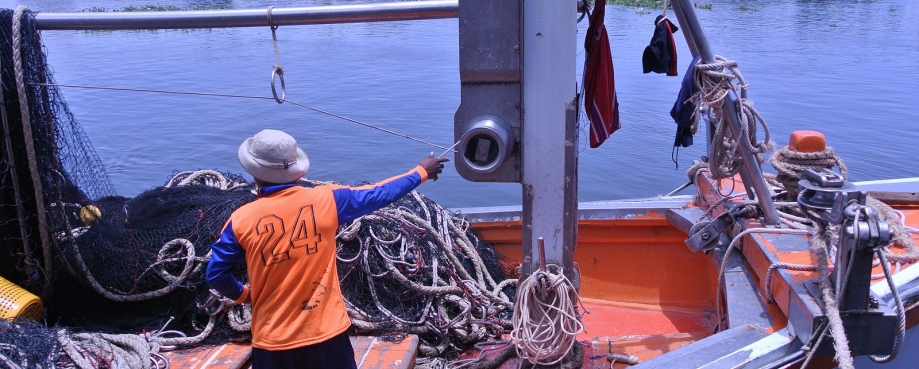
In March, an ILO committee set up to examine the use of forced labour in Thailand reported on its latest findings. This followed international trades union complaints in February 2016 about Thailand’s slow progress in addressing the abuse of migrant workers in its fishing and farming sectors.
As you would expect, the new ILO supplementary report on forced labour in Thailand is very detailed. But, nonetheless, it's worth a read and is important because it provides a credible snapshot of the current state of play.
The ILO report recognises that there is still a long way to go, but there has been some progress.
That’s significant as it also chimes with our experience over the last year.
Long-time readers of the ETI blog will know that we have a working group that is exploring ways to encourage and support employment reforms in Thailand.
Particularly in relation to migrant workers’ rights in fishing and in seafood processing.
Our tripartite working group includes the International Transport Workers Federation, the Trades Union Congress, large UK supermarkets and the NGO, Anti-Slavery International.
Keeping in contact
As well as working with group members, we are in dialogue with the Thai Government, the ILO, industry associations and leading Thai companies.
We are engaging with a Thai trade union and a coalition of Thai NGOs.
We are also a member of the external advisory group to the crucially important Seafood Task Force, a company-led initiative seeking to drive sustainability in the Thai seafood sector through supply chain oversight.
Through these relationships, we seek to influence decisions on the ground and to shape future thinking and planning to tackle the on-going issues referred to in the ILO report.
Additionally, we keep in contact with international labour rights activists.
They have an unambiguous role to play in campaigning against human rights abuses. No matter how uncomfortable that might be for business and government.
In line with the UN Guiding Principles on Business and Human Rights, we make very clear to all those we speak to, what responsibilities various players have.
Apart from the fundamental responsibility to respect and remedy, this includes their role in helping to drive future solutions. Firstly, that means gaining a better understanding of workers’ rights and good international business practices.
It also requires consultation and coordination across the board, importantly with workers and their representatives.
And not just in fishing.
Thailand faces problems throughout its food, fishing and farming sectors, as recent cases around migrant labour abuses in the poultry sector show.
International watchlists
Last year, the US State Department upgraded Thailand from Tier 3 (the worst grade) to Tier 2 on its human trafficking, or TIP, watchlist. Meanwhile, the EU retained Thailand’s Yellow Card status first instituted in 2015.
The former was controversial at the time, with many arguing that Thailand should remain at Tier 3.
But, ETI believes it was a fair reflection that the Thai Government is taking reform steps. Even though, as the ILO recognises, these have not yet gone far enough.
The ILO also recognises that implementation of reform is still too slow with the quality of implementation needing to be much better to have the desired impacts.
We agree.
However, Thailand is moving in a positive direction. The carrot along with the stick approach is working.
Thailand is committed to do more and to ratify ILO conventions 188 on fishing, 29 on forced labour and potentially 87 on freedom of association and 98 on collective bargaining.
We are strongly recommending that they ratify all four.
Acknowledging progress
Progress may not be as well managed or as well implemented as it should be, and will require a huge effort.
Yet, Thailand is very far from what “business as usual” looked like two or three years ago.
This should be acknowledged.
Thailand is a state on a journey. But the pathway is not smooth, reflecting various forms of resistance, ignorance and criminality that must be overcome.
ETI therefore believes that the Thai government must do five things in order for its reform programme to be effective:
- Invest still more in its regulatory activities including the number of inspectors, quality training and the budgets to do their jobs effectively.
- Secure technical support to help solve the highly complex and critical failures of migrant recruitment agencies and ensure that legal recruitment is easier and cheaper than illegal recruitment.
- Open up reforms – and in particular the impacts of those reforms – to independent third party verification and transparent reporting. And this needs to include fuller information on prosecutions.
- Recognise the value of migrant workers to the Thai economy – through policies and respect and through effective implementation of reforms, as doing this will be a win-win for workers, the prosperity of countries that supply workers and for Thailand itself.
- Give encouragement, recognition and protection to whistleblowers and rights advocates.
Ultimately, Thailand needs to do better at supporting, consulting and collaborating with local Thai stakeholders – particularly industry associations, trade unions and worker representatives and civil society – and to encourage progressive leadership wherever possible.
